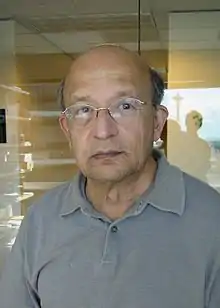Suresh H. Moolgavkar | |
|---|---|
 | |
| Born | 3 January 1943 |
| Alma mater | Johns Hopkins University |
| Known for | Two-stage Clonal Expansion (TSCE) Model of Carcinogenesis |
| Scientific career | |
| Fields | Epidemiology, Mathematics |
| Institutions | University of Washington, Fred Hutchinson Cancer Research Center |
Suresh H. Moolgavkar (born 3 January 1943) is an Indian mathematician and epidemiologist who was at the University of Washington and the Fred Hutchinson Cancer Research Center in Seattle. He is a Senior Fellow and Research Scientist at Exponent, a consulting firm.[1] Among his many scientific contributions is the development of the two-stage clonal expansion (TSCE) model of carcinogenesis, also known as the Moolgavkar-Venzon-Knudson (MVK) model, a stochastic cell-level description of carcinogenesis based on Alfred G. Knudson’s two-hit hypothesis.[2] In its original development the TSCE model[3] represents tumor initiation as the first hit, followed by cell proliferation (clonal expansion) and malignant transformation as the second hit. It has been interpreted as describing the initiation-promotion-progression sequence observed in chemical carcinogenesis and has been applied widely for the analysis of both experimental and epidemiological data for purposes of quantitative risk assessment.
References
- ↑ "Suresh H. Moolgavkar". www.exponent.com. Retrieved 23 December 2022.
- ↑ Knudson, Alfred G Jr. (1971). "Mutation and cancer: Statistical study of retinoblastoma". Proc Natl Acad Sci USA. 68 (4): 820–823. Bibcode:1971PNAS...68..820K. doi:10.1073/pnas.68.4.820. PMC 389051. PMID 5279523.
- ↑ Moolgavkar, Suresh H.; Knudson AG (1981). "Mutation and cancer: A model for human carcinogenesis". JNCI. 66 (6): 1037–1052. doi:10.1093/jnci/66.6.1037. PMID 6941039.